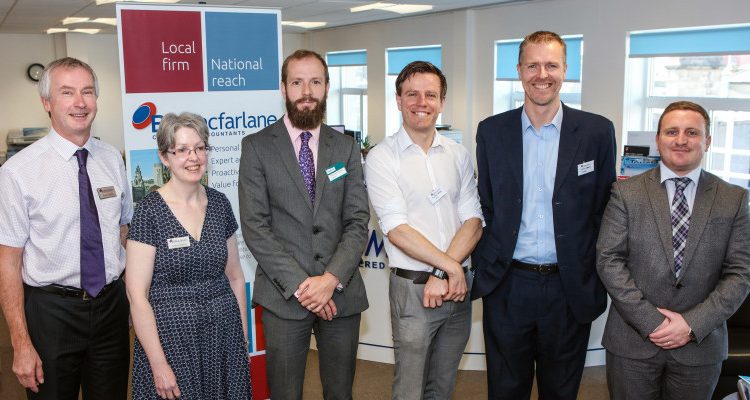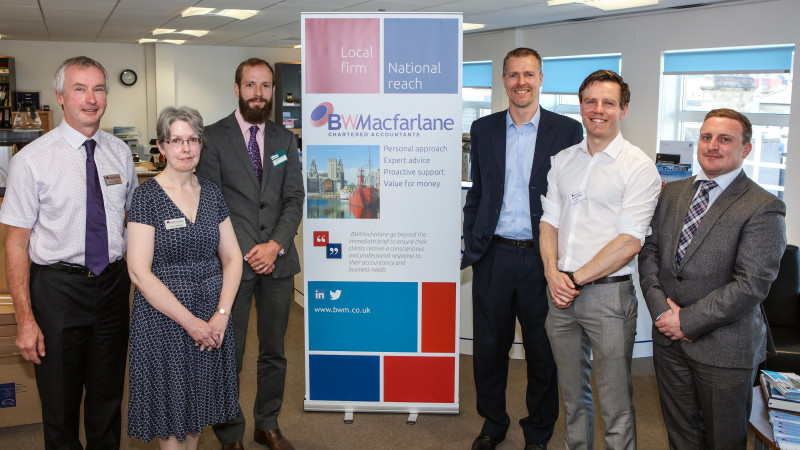BWMacfarlane host Autumn Charity Update
Liverpool-based accountancy practise BWMacfarlane have picked up the national award for “Most Innovative Medium Sized Firm 2015” at a conference hosted annually by 2020 Innovation group; having hosted their Autumn Charity Update earlier this month at their offices on Castle Street in the city’s commercial district.
The event was attended by more than fifty representatives of Liverpool’s charities and third sector and focussed on affecting issues and recent changes to legislation; and included presentations from Exchange Chambers, RBS, Stack Group, LCVS and Weightmans as well as updates from audit partner Lesley Malkin.
Nicholas Walker from Exchange Chambers kicked off the morning’s proceedings with a talk on ways to manage and avoid bribery and corruption in the workplace. He said:
“We live in an unforgiving world, where people are very happy to hold charitable organisations to account. It is more important than ever and you must consider the potential damage to your reputation if you are associated with an act of bribery.
“A zero-tolerance attitude towards bribery or any act that can be construed as bribery, for any business, should be at the heart of your code of ethics. You should ensure training is robust, communication of your principals is stringent and take care to carry out due diligence on any new employees.
“Bribery accusations can be difficult to deal with when they occur, but if you apply common sense, think about it in a proportionate way and use the guidance that is available it can be avoided.”
Shaun Thomas of RBS Group gave an eye-opening presentation on the ways fraudsters can access personal information, particularly in light of the ever-growing social media culture. Many of us are generous with our information on platforms such as Facebook and Twitter, but it can be to our own detriment.
He said:
“Fraudsters are smart at fishing for information. As business owners, or those in a position of responsibility for safeguarding a business, you should take care to put measures in place to protect your organisation from fraudulent attack.
“Things like geographic profiling, stronger passwords and reviewing and limiting access to your online banking system or implementing dual authorisation could be imperative in helping to avoid significant loss through fraud.”
Steve Cobham of disaster recovery specialists Stack Group picked up the mantle next, addressing delegates of ways to survive a data crisis, urging delegates to consider the impact on their business in light of data loss or prevention.
He said:
“When it comes to disasters, many people think ‘it’ll never happen to me’ – that’s not a great strategy for protecting your organisation.
“In fact, almost a quarter of companies declare a disaster in a five year time period. Eighty per cent of those businesses who suffer a major disaster go out of business within three years, forty per cent in just a year – some sobering points.
“Every business should have a disaster recovery plan in place in order to protect their operations and profitability and keep client data safe and above all guard their reputation in light of a data disaster. Trust is earned over many years but can be destroyed in an instant if you don’t respond correctly in a crisis.”
BWMacfarlane’s Lesley Malkin and Peter Taaffe gave a brief overview of changes to charities SORPs (Statement of Recommended Practice) and the Gift Aid Small Donations Scheme (GASDS), which allows eligible charities to claim ‘top-up’ payments on cash donations of £20 or less.
Development officer at LCVS, Richard Davies gave the penultimate presentation on demonstrating impact and public benefit reporting, saying:
“Competition for funding is more acute than ever so there is more of an emphasis to demonstrate the impact of your work. There are tools, like the Social Return on Investment (SROI) that can help you to do this. They can be costly and at first complicated, but by and large worthwhile.
“My advice, though, would be to combine your evidence gathering so you’re not relying on a single source. Engaging stakeholders and converting the pounds invested can be incredibly powerful if the figures stack up. It’s not rocket science, it’s just about being systematic.”
Finally, Matt Smith, employment solicitor at Weightmans gave an insight into employment law and employers’ duty of care towards charity volunteers. He used some familiar scenarios to bring his presentation to life – ‘Pig gate’, Sir Peter Vigger’s floating duck island and Jeremy Corbyn’s sensationally socialist manifesto all helped paint a picture for delegates.
He summarised:
“Whilst you have no ‘legal’ obligation towards volunteers, you do have a moral obligation and a duty of care. You should set out standards for the recruitment of volunteers in order to protect both them and you; and you should certainly ensure their wellbeing under your care by including them in health and safety policies.
“Avoid perks that could be construed as wages or remuneration and take care to use the right language if you decide to draft volunteer contracts or agreements.”
Peter Taaffe, managing partner at BWMacfarlane said of the morning:
“BWMacfarlane act for or work with more than 150 charities in the region, so we like to think we know what we’re talking about. We’ve been hosting our Charity Update events for more than two years now and it’s become something of a staple, not just for our own clients but for the charities sector generally in Liverpool.
“It has become so popular that we took the decision to extend the event to a half day seminar. This has allowed us to work with partner organisations and offer our attendees more information across a host issues that may affect them.
“I certainly think it has worked well, we’ve had a fantastic response from delegates and I’d like to personally thank all of the morning’s speakers for working with us on a successful event.
“The morning was demonstrative of our team’s commitment to deliver events that cater for the needs, not just of our own clients, but of the wider charity sector. Our award from 2020 Innovation is greatly welcome and just reward for our team, who work hard to tailor the events specifically in order that we deliver some real and tangible benefit to attendees. I couldn’t be more proud of their efforts.”
2020 Innovation is a leading organisation providing innovative solutions for progressive accountants and tax professionals worldwide. On collecting their award for “Most Innovative Medium Firm” 2020 gave praise to BWMacfarlane for their evolving events programme. The firm make it a priority to host regular events, tailored to aid the growth of their growing client base.
BWMacfarlane have extensive experience in working with charities, social enterprises and not-for-profit organisations and offer guidance on changing regulations, funding requirements and industry climates as part of their complete accounting and business planning service.
For more information visit http://www.bwm.co.uk/charity-services/ or call 0151 236 1494


